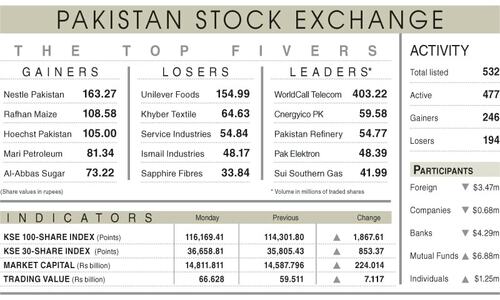 The surging food prices are as a major challenge for the country’s economic managers and the people have lost hope for any relief while officials continue to paint a rosy picture about the economy.
The surging food prices are as a major challenge for the country’s economic managers and the people have lost hope for any relief while officials continue to paint a rosy picture about the economy.
Food prices which have a weightage of 40.34 per cent, rose by 18.25 per cent in January 2008 from a year ago and 3.04 per cent a month ago, touching new heights..
The situation can be attributed to artificial and real shortages, absence of smooth supply line to check hoarding, poor administrative measures, 19.6 per cent growth in money supply and low domestic savings rates.
In an attempt to counter core inflation, the State Bank of Pakistan raised its key discount rate by 50 basis points to 10.5 per cent on Jan 31.The SBP governor then warned that huge government borrowings are also responsible for increase in inflation. But there is also a need to prevent bank credits from being utilised by hoarders of essential commodities. The tight monetary policy has not even helped to combat rising core inflation. A paradigm shift is needed in policies of both the central bank and the government to tackle food inflation.
Food inflation was 12.2 per cent in December 2007, down from 14 per cent a month earlier. The double- digit food inflation is being witnessed since September 2007.This stubborn food prices pushed up the overall inflation to 11.86 per cent in January over the last year. This will be the biggest increase in a month in over 11 years, hitting the low income group and reducing their purchasing power.
Analysts say the full year inflation would be in the range of 9-10 per cent by the end June 2008 as against the government projected target of 6.5 per cent.
Among the food items, non-perishable products witnessed 21.67 per cent increase in January 2008. It is not the seasonal food items but products like wheat, flour, rice, edible oil, pulses, sugar witnessed significant increases.
The seasonal perishable food products witnessed a decline of 3.44 per cent in January over the last year. These include potatoes, onions, garlic, tomatoes.
Analysts say this surge in food prices can impose high cost on the economy while disproportionately hurting the poor and fixed income groups. It can undermine macro- economic stability and impact adversely on investment costs.
The government has failed to curb the smuggling of wheat, sugar, pulses to neighbouring countries and to crack down on commodity hoarders believed to have ‘right’ connections.
Edible oil prices have shot up by as much as 100 per cent in a year rising on the back of international palm oil prices. The government is not ready to reduce tax which is in the range of Rs26-30 per kg of the edible oil.
Another crisis looming large for people is that rice is exported at much lower price than India while the domestic price has witnessed a 100 per cent increase. As promised by the interim prime minister, the government has yet to regulate the export of rice by stopping exporters from earning huge profits at the cost of local consumers.
The government has also failed to develop livestock and overcome the rising meat prices. Even the import of meat from India has not so far stabilised domestic prices. Milk is also becoming costlier.
Analysts say, like wheat, the government should also procure, if necessary subsidise pulses to regulate its prices in the local market.
As for perishable products, the government has failed to encourage its processing industry which is essential for commodities like potatoes, tomatoes, onions and vegetables. Upgraded transportation facilities, cold storages and warehouses for avoiding waste of these commodities are also urgently required. .
Another crushing blow to millions of people is the continued rising medical expenses which increased by 7.46 per cent in January. Similarly, the house rent went up by 9.47pc over last year. Again all this happens as a result of absence of regulatory authorities for checking prices of pharmaceutical products. Education is also becoming costlier because of the rising cost of text books and education fees in the private sector.
The raw materials prices increased by 9.39 per cent in January 2008 over last year at wholesale level, while the food products witnessed 19.46 per cent. This indicates that retail prices of these products will witness further increase in the months ahead.
By freezing oil prices in the domestic market, the government is trying to contain non-food inflation, which stood at 7.3 per cent in January 2008. But analysts say that the government may have to set up a commission to control prices.














































Dear visitor, the comments section is undergoing an overhaul and will return soon.